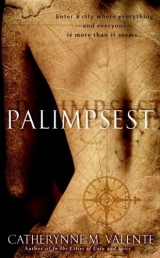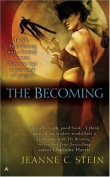
Текст книги "Palimpsest"
Автор книги: Catherynne M. Valente
Жанр:
Классическое фэнтези
сообщить о нарушении
Текущая страница: 17 (всего у книги 19 страниц)
“This is what she says, Ludo. If you can make sense of it, good luck to you. ‘These are the folk who may pass into the kingdom of heaven: the grief-stricken, lovers, scholars of a certain obsessive disposition. Brute beasts. Women who have become as men and men who have become as women. Writers of books with long titles. Only those knights who have failed to touch the Grail. Industrious women. You, and I, and a boy named Oleg, and a girl with blue hair.’”
Nerezza was crying again. She turned to November, speaking rapidly, angrily, and all Ludovico could understand was the name Radoslav, repeated and repeated, desperately added to the list. But Ludo hardly heard Nerezza. He stared at November, her wet and hopeful eyes. She thought he would not understand. That he would think her words irrelevant. But he did know, he understood, for he had loved St. Isidore all his life, an encyclopaedist, a man whose intellect was confined in long, precise, radiant columns of text, illuminated lists which placed together circumscribed the world.
Nerezza looked back and forth between them, helpless and livid.
“Another one is coming,” she hissed in Italian. “I heard her talking on the telephone. I hate you both, and I curse you, as well as I am able to curse anything. You blithely stumble into this, and in a few weeks you’ve done what I can never, never do. Do you understand? Radoslav is dead. None of us can ever go. Not ever. And it took us yearsto find each other. It took everything from us. Husbands, wives, jobs, children. You’re like a rich man’s son, who has earned nothing in his life and is given everything. I let you live in my house and you cover it with your shit. I hate you. I hate you.” Her voice was even and furious, it did not hitch or break, and he could see the sparks of her eel-flesh grimly blue at her ears.
“Nerezza,” November said, “Nerezza. Nerezza.”
November kissed her reddened forehead. “I’m sorry,” she whispered, over and over. “I’m sorry.” And she kissed her mouth, her jaw, her ear, her neck, trying to kiss everything hard of her away, and if he had not felt the bees in her, if he had not heard them sing, he would not have understood how November, broken and battered as she was, could have the courage to comfort the wildness, the bestial scream of Nerezza.
But Nerezza would not let herself be kissed. She was stiff and cold, her body held tight and inviolable. She clamped her eyes onto Ludo, full of bile and bitter loathing.
Then Nerezza’s eyes shone, and suddenly she smiled. She put her arms around November, never taking her gaze from Ludo, and let herself warm, alight, feign ardor. Ludo shuddered. What had she hatched in that lightless heart?
Nerezza clung to November as the bee-stung woman pushed the top of her own green dress down to her waist and held her breasts out like St. Agatha, an offering. November opened her eyes and caught his gaze over Nerezza’s shuddering body. Ludo could not tell if the shuddering was false or true. She was whispering in Italian, too ashamed to be understood, and Ludo knew the beekeeper could not hear it, and vowed to explain it to her, when he saw her on the other side of night.
“Am I, November?” Nerezza was saying. “Am I among the folk who are permitted to enter the kingdom of heaven? Tell me. Tell me.”
_______
He left them then. He did not want to watch. He did not want to see.
But he knew November now, he knew her, and she was his Isidore, his Isidora, and he would tell her everything, everything he knew, everything engraved in his marrow, when all this was done and they could speak, and drink together wine like blood, through the starry night and into day.
PART V:
THE GREEN WIND
In Transit, Westbound: 11:09
THERE IS A PLACEon the far western edge of Palimpsest where the tracks have fallen into disrepair. It is wild and sunny, furry with green wheat and snarling raspberry vines. An olive tree, some speculate, rooted out the rails, while others are certain that the nearby sheep are the culprits, that they gnawed at the tracks until they broke, and surely their owner ought to be held responsible for damages. No one has volunteered to take up the wig and adjudicate the issue, and so lonely, moth-bothered Oathusk Station has slid slowly and genteelly into disuse. It was not often frequented even in the first heady days of the transit system, and so few consider it a great loss, save, perhaps, for enthusiasts of the particular pastoral style of architecture employed in the station house, whose rosebud windows were once a mild source of pride.
The trains did not discover the breach in the tracks for some time. They were distracted, the season was not right for westbound travel, the Missal Line had gone into heat early for three years running—the life of a train is ever tossed by strange and chthonic tides. But as of late some few of them have begun to nose around Oathusk, sniffing the wind for news of the rosebud windows, of the black-faced sheep, of stationmasters gone to seed and drink. A train or two came quite close to the break, but reared in alarum and proceeded east into the comforting arms of the city once more.
There is concern, in the highest echelons of sport commuters, that a train might one day become bold enough to jump the tracks at Oathusk and escape Palimpsest altogether, into the wilds beyond and the mountains, through the wide farms and pastureland, and from thence who knows? Yet still others deride this idea as the worst sort of fancy: the trains are happy, they are loved, they are well-fed and well-mated. In the midst of debate, the tracks go unrepaired. The wheat bends the wind at Oathusk, and the stars watch the raspberries grow long.
_______
The next carriage is empty. It is a long, vast stretch of new tatami mats, redolent and bright green, their ribbons black and gold. Sei cannot begin to count them. There is a slender station map like an ukiyo-e painting on one wall, and the room shakes like a carriage, but there are no benches, no rails. It is a place she knows and does not wish to.
“No,” she groans. “I don’t want to be here.”
“But it is your home,” the Third Rail says. Plenitude scratches at her neck encouragingly.
“I don’t like it, I don’t want it. I told you. I want to go to the next car. The rabbit said there were horses.”
The Third Rail shakes her long head. She strides to the center of the room and Sei knows what will happen but she cannot bear it, she cannot bear this. “Why?” she yells at the Third Rail’s back. “What purpose could this possibly serve?”
The Third Rail turns and seats herself in the great room, letting her unlined kimono pool out around her and smoothing her long hair into two flat planks. She reaches into her robes and withdraws an enormous book—it is swollen and waterlogged, and reedy bits of kelp and grass peek out from its pages like ribbonmarks. She opens it on her lap; lake-water splashes out. The Rail beckons Sei with sweetness, as if she is luring a cat from under the bed.
“No,” Sei moans, but she is going to her, could never have done less than go to her.
“Imagine a book at the bottom of a lake,” the Third Rail says.
“I told you not to say that. I don’t like it.”
“But I have gotten you the book. It was a very deep lake, frozen in places, high at the top of the world. I held my breath for a very long time.”
“You’re lying. There was never any book. My mother was crazy. She said those things because she was sick.”
Yet Sei inches closer. She is watching the space between the Third Rail’s breasts, white and smooth. The book is open; its pages are blue. The Third Rail opens her arms to take Sei in and cuddles her against her hip, pointing her long finger to the pages so that Sei can read.
“This is to say: I will hold nothing back from you, with either hand. All things, at the bottom of all lakes.”
Sei rubs her throat; it is tight and thin and she wants to run from this, but she is the Sei-fish again, twelve years old, blue and separate from the other fish, and she does not know the piscine joy they find in this volume, but she wants to, so very much.
She peeks at the page. Just a glance,she thinks. And then I will end this. It is obscene, and I can shame her into stopping it.
The book reads:
I really was born in a train station, you know. My mother went into labor, and I came so fast. I was always too fast. Too soon. She took me home, and I grew up, just a little girl, my head full of books, my hands full of calligraphy brushes. I had dreams like some children have freckles. And my sisters made fun of my name.
I married your father as soon as I could manage it, and he left me so often. I was so alone. I had only books and dreams and brushes then. And often I slept—but it was not like really sleeping. The world went black, and it went light again much later. My head hurt as though there was another baby inside it, pushing with her little hands to get out. The walls seemed so close, so close! The whole house was like a gag in my mouth, I could never breathe, and I could not leave it—your father could come home at any moment, and if I were not there, he would never come home again, I was certain.
You do not know that I went away when you were very small. I was not even finished nursing you. I went away to a place in the country where they folded me up into a very white bed and put a piece of wood in my mouth and arced blue electricity through me. I remember that it was blue, like the light at the bottom of a lake. I held it all within me, all of it, all that light, I would not let the smallest bit out of me. I held it as though I was made to hold it, as though I was a third rail and all the world’s tracks laid around me—it was mine to move the lightning, mine to bear the white heat and the burning. I am sure they were impressed. They knew they could trust me with it, they gave me more and more, so that I could keep it safe for them, and I know you saw it when I came home, saw how incandescent I was, saw the light sizzling in the roots of my hair.
Sei looks up, her tears naked and hot as blood. The Third Rail is bleeding, thick trails of it, hot as tears. The space between her breasts is gouged open, and her blood pools on the already sodden book, stains the hems of her kimono.
“Please stop. Please, please.”
The Third Rail puts her hand to the bottom of her red mask and lifts it, and of course it is Usagi beneath it, Usagi-mother with such sad eyes, her face wan and worn, her lips shaking.
“ The floor of heaven, Sei, is laced with silver train tracks, and the third rail is solid pearl. And they carry each a complement of ghosts, who clutch the branches like leather handholds, and pluck the green rice to eat raw.”
“But this is not heaven. It isn’t.”
“No, Sei. But it is enough. For you. Everything for you.”
“ Why?What do you want?”
“We want to fly. We want to leave the tracks, we want to roam and graze and howl at the mountains. We want to escape the world of our mother and our father, who pretend not to know we live and move and desire under the earth, just as they do. Don’t you want to escape your mother?”
Sei stares at the blood on her lap. She is not listening.
“I sat with you for hours, and there was so much blood. It took so long. It took so long.”
“It takes a long time to die. Even if it is quick, it takes a long time. It was hard to leave you—I think that is what you want me to say. That I did not want to leave my child. But it takes a long time. Your heart must stop, and your breath, and then the small things that you did not know kept you alive, books and dreams and brushes. And then you must walk a very long way in the dark, through the mountains, and there are pine trees there, and lanterns, and you can see before and behind the long trail of lanterns winding up and down the mountain, before you and behind.”
“You’re not really my mother. I know you’re not.”
“I am as good as your mother. I can be your mother, and you can be mine. It will be like a game. I remember your mother. I was built to remember. I was built out of remembering.”
Sei looks into eyes that could be Usagi’s, that could be her own sad, confused expression, with all those tigers at her ears. She puts her hand to her mother’s breast, the ruin of tissue and blood there, the wound like a heart.
“Lie below me,” Sei says, remembering her grandmother beneath the weepholes and her mother beneath the earth and she herself so far from the sun. “And I will watch over you.”
Beneath her palm the slash of her mother’s wound vanishes, as though the skin there had never dreamt of tearing.
Sei sinks into the arms of the red-masked ghost, and the Rail holds the blue-haired girl tightly, with a love like light. The Third Rail rocks her, and Plenitude curls up between her arm and her still-flat belly, and soon enough begins to snore inkily.
“There is not so very far left, not so very much left of the train,” the Third Rail says. “Before we open the conductor’s cabin and pay our respects, tell me, my Sei, my little fish, my child: is there someone who would come looking for you?” Her red voice is suddenly softly accusing.
“No, of course not. No one knows me here.”
“We knew you.”
“That’s different. There’s no one, I promise.”
“And yet she is here.” The Third Rail kisses Sei on her shoulder and purses her pale lips. “Tell us. Give us a command. Tell us to open our doors to her, or keep them shut as a mouth and leave her gasping on the platform. Guide us, tell us what it is right to do.”
If Sei tries—and it is becoming harder and harder—but if she tries to feel the others whose phantom senses float up under her own, under her tongue, under her fingers, under her feet, if she tries to feel them, she can just discern the smell of a train station, of the oily tracks, of the underground.
“Let her come,” Sei says, and falls asleep on her mother’s lap.
ONE
WISHES TO THE TREES
It’s over,” Sei said, folding her hands in her lap. They sat, squinting in the bright sunlight, at a restaurant wedged between two Buddhas.
“What does that mean?” Yumiko said, slurping her mushroom soup. “It’s not like you’re the first. Get an abortion.”
“It means,” Sei breathed deeply, ignoring her, “that I think there is no one left in the Floor of Heaven who is new for me. I’m not . . . like you. When I am there, I am always on my train, always with the folk there, and they barrel through under the city at such a speed—I’ve had to chew through Kyoto at the velocity of a new whore just to keep up. I am tired, and there is no one left. It’s time for me to go home. To visit my mother’s grave. To see if I still have a job. To figure out what to do about the baby. To find others, if they are there.”
Yumiko frowned. “An abortion would be better.”
“I’m not saying it wouldn’t.”
Yumiko shook her head. “You don’t understand. I said you weren’t the first. Occupational hazard, you know? It happens, kind of a lot. It happened to me. I had a son, about two years ago.”
“You never told me this before.”
“My father kicked me out. I come from a small town—girls don’t turn up pregnant there, except, you know, when they do. But I’d been coming into the city for years by then, and he sent me back there, to sleep with demons and drink myself to death, he said.” Yumiko saluted Sei with a glass of yellow wine. “I didn’t know how it would be. I had my baby, because I had some misplaced idea about the sanctity of motherhood, and I was young enough that I figured it would be more or less like having a doll. I had it, in the back room of the Floor of Heaven, between the wineglasses and the bar rags. My son was covered in streets, these long black lines from his scalp to his feet—but it wasn’t Palimpsest. It was someplace else. I think it was someplace new. I’ve never heard of a street he had on him, and anyway they didn’t look the same. They were long and straight and even, a grid. It was someplace else. And he looked at me, just turned his baby head and very clearly said: I want to go back. I screamed for a week. He was in me all that time, dreaming and traveling and learning, and I couldn’t bear to have him look at me.”
“What happened to him?”
“The owner and his wife adopted him. Thank god. I told them never to bring him there, bring him up to be a priest, hope he dies a virgin.” Yumiko took a long, shaky drink of her wine. “So, you see, you’re not breeding. You’re not having a child. Itis. Palimpsest. An abortion would be better.”
Sei swallowed hard. She couldn’t answer. Couldn’t imagine that child, couldn’t imagine her own.
“And I don’t want you to go,” Yumiko said. “I won’t say I love you, I think we’re both beyond that. But it’s good to have a friend who knows what I know. Peaceful. Who never doubts that there are wonders outside this city. Isn’t it peaceful to know what we know, and know it together?”
“Of course it is.”
“Then stay. Stay a few days more. Pray for your mother here. There are more shrines and temples than you could count in a lifetime. One of them is good enough for her.”
Sei scratched her cheek and stared off into the bustling street. It was peaceful to know, and yet to know meant that the volume, the resolution, the brightness of Kyoto was dimmed and fuzzed, and she could not pick out faces here anymore, because they were not long or red.
“My mother killed herself when I was fourteen,” Sei said slowly. “She stabbed herself in the chest with a kitchen knife and crawled into our tatami room to die. I found her when I came home from school. Do you know how long it takes someone to die from a wound like that? Hours and hours. More hours than I could count then or now.”
“Sei . . .”
“And I never called a doctor. I’d like to say she begged me not to, but she didn’t. She just looked at me, she just waited to die, and didn’t pull out the knife, didn’t move. She talked about the tigers, when she talked. I held her for hours and I let her die and all I said was: Go, go, please just go. Which shrine do you suggest to purge that, Yumiko? What god do you think will forgive me?”
“I don’t know. I know you’re not her, whatever you think.”
“I talk about crazy things and abandon my child.”
Yumiko took Sei’s hand, laced her fingers through it, shaking her head all the while. “Please: stay, stay, please just stay.”
The late afternoon light played in Sei’s hair, turning it turquoise and black, like the light at the bottom of a lake, like the light in hidden places.
_______
Two women stood on a wide pavilion of crushed white stones and high orange pillars, one with blue hair, and one with a blue skirt. Hand in hand they sought out the row of heavy bronze bells with their ponderous red ropes. They clapped their hands and rang the bells for the soul of Amaya Usagi; they gave their coins to the gods and stood in the shadowy alcoves in contemplation of statues with dead eyes. They tied wishes to the trees, and did not tell each other what they wished for—there was no need.
They drank silver sake and fell asleep in each other’s arms, without kisses, without farewells.
77th and Ambuscade
THE ZOO THAT ONCE SPRAWLEDover Ambuscade Street is empty. The cages are still there, and pigeons have found them acceptable housing, being full of slow, fat lizards and flies like blackberries. But the animals have gone. There are kiosks whose awnings were once gaily gold, and sold frozen green apples and phials of crystal honey—but they are empty now, and the spilled seeds have long sprouted so high that each of them is a small grove, and if children ever ventured here any longer, they would find the apples so cold, so cold and sweet.
At night, the moon sweeps through the paths like a tumbleweed. The stars sit on the benches and smoke corncob pipes and throw petrified peanut shells at the ghosts of giraffes.
There is no mynah bird left to tell you what happened here.
But I will tell you, for I feel we have become friends, you and I. Casimira, beloved of my soul, fought with such weapons as she had: vermin, and insects, and scurrying creatures. Her cannon, her artillery, her cavalry were all these things—oh, the days when the rabbits of Casimira were larger than horses! When her elephantine crows soared high, casting their gargantuan shadows over whole districts! Was there ever a general like her, ever a creature who dared more? How could I not love her? How could I not give myself to her?
The opposition could not bear her strength, and her soldiers seemed to be endless, as ants and bees always seem to be. They felt, Ululiro felt, that they must become as she was if they were to save the city from her green hands.
So the Ambuscade Zoo was confiscated, cordoned off, and the animals in it brought to a building like a palace, but not a palace, where they were penned up, frightened, shaking, cats with cats and fish with fish and like with like. Ululiro herself underwent the procedure, as a gesture of loyalty, and I did love her then, too, in that moment. But my heart was given, given already. Ululiro wept as they cut into her, and into the shark, and her blood is yet upon the door frame of that palace which is not a palace, indelible as the stone.
Thus the soldiers of the opposition became as Casimira: innumerable beasts, stronger limbs were sewn in the place of weak human ones, stronger teeth, more vicious heads. And because they were ashamed, because to become what they became was to become inhuman, the surgeons cut out the larynxes of all the poor souls they altered, so that they could not speak of what had been done to them, or what they would do in service of the war. Perhaps they knew, even then, how uncharitable their cause had become. I cannot say—they do not speak of it now.
I know you weep for these things. I weep for them. And more for those brave, gallant souls of Casimira’s tribe who underwent such procedures secretly, without glory or fellowship, in order to be trusted by the opposition, in order to fight well, who took mule-legs for her sake, and bear-feet, and frog’s heads.
_______
Ambuscade Station is a dreary, dank place since there is no zoo to draw the laughing or the moneyed. The shouts of the not-too-distant Troposphere barely penetrate the gloom. The platform is empty, and spiders crawl along the poles, ticking, clicking, and November can almost understand them, they are close to bees in language, but in the end they are beyond her, their paeans to Casimira private and eight-versed.
She stands, and cannot imagine what time the train might come, but she knows the train is the right thing, she knows the girl with blue hair is nearby, and she trusts, she trusts now, that the golden, liquid hymn vibrating within her will call it like a river-lure. Please, she thinks, oh, please.
The train arrives like an answer, and the doors slide open. She is surprised. It is a long, silver train, bright, new, gleaming like an arrow shot from the moon.
Would you like to ride upon the Leopard of Little Breezes?she thinks, and leaps before her stomach can answer.
_______
The carriage is lined in silk, red silk, and women in long, glistening masks the color of blood and thick, layered kimonos stand at small tables set with tea services. The tea is red, and there are lumps of black within. A few men and women sit hunched at the tables, and the women look proprietary, caring, possessive of their charges. They glare at her coldly. They offer her nothing.
She walks slowly down the polished floor of the carriage, and as she passes the women with their poised teakettles, they turn their heads as one to regard her with icy disdain. They smell of metal and cherry pits.
“Get out,” one of them hisses. “You can’t have her.”
November runs and steps into the space between carriages, her heart throbbing.
Where are you, Amaya Sei?
The next carriage is vast, covered in rice terraces stacking up to a genuine sky, a genuine sun. All along the terraces folk stand in red hats fringed in gold, lined up perfectly along the water’s edge, staring down at her with wintry, hurt expressions. She begins to walk under their gaze, but it is very far, the carriage is so long.
“I am thirsty!” she calls out.
A little boy with a jangling hat screams down: “There is nothing for you here! The rice of grief is withered because you have set foot here, where no one wanted you!”
“She wants me!” November cries. “Amaya Sei! I will find her!”
“She is ours! We have made all these things for her! You can’t take her away from us!”
And the villagers of the second car let loose long copper ladles from bows of rice roots, and November runs again, she must run, through the pleasant countryside, and even still the ladles strike her and bruise her and the bees within her shriek in terror. A fusillade crashes into the carriage door as she closes it, and November’s belly flinches with every blow.
She passes through the carriage of cabbages, and the plants recoil from her. One opens and there is a thing inside it, a word, in black print that wavers like skin crawling: stranger. It hisses at her, and ink spatters her already-black cheek. She passes through a carriage of pine trees, and men in long black suits scowl and spit upon her. As she passes them, they reach out to clutch at her coat, her breasts, her hair.
“We do not want you,” they slaver.
Amaya Sei,she thinks, is this your kingdom? Amaya Sei, is this your hive?
November passes through a carriage of crusted white rock and hanging reeds. There is a rabbit-man there, a veteran, she thinks, mashing rice in a barrel with a great hammer. She tries to inch past him, but he blocks her way with a withered paw.
“Please, I am trying to reach Amaya Sei.”
“I know, child,” he says mildly.
November is surprised again—veterans do not speak.
“Then don’t stop me. If you want her so much, let me find her. It is the only way you can have her for good.”
“I know that, too.”
“Then I’m confused.” She touches his long, gray ear; he endures her wounded hand. “Were you in the war?”
“What an interesting question. No, you might say, and yes, you might say. You might say I am embroiled in its final skirmishes even now.”
“But you speak.”
“I was not in the war, I said. The mochi needed such care in those years, I could not leave it.”
“Then why have you such ears, such paws?”
The rabbit looks at November with a chagrined, sorrowing expression. “It is what she expected,” he says. “To see a rabbit with a hammer, and rice. I wanted to look right for her. For Amaya Sei. There are still surgeons in the world, and this train has caught a few when they were not looking. As it caught me, on a platform, on a Wednesday morning when the coffee was thick and I was not paying attention. As it caught a war-rabbit, still bound up in its saddle, in the last days of it all, when it bent to snuffle for scraps in the dark. I could not even tell my employers I would not be at my desk. I could not tell my wife or my son that I would be away. I was a candymaker, you know. I like to think the city went sour when I vanished from it, but that is probably not the case.”
“In what sense, candymaker, are you fighting the war even now? I am not a warrior, I have not come to fight you.”
The rabbit leans in close and brushes her nose with his. It is soft, as a rabbit’s ought to be. “Do you not know, even now, what they fought for? There was a time when it was easy to cross the bridges and tunnels into Palimpsest. When you might fall in a river or bleed until you fell through the skin of the earth. When you might dig a hole from China all the way here. But too many came, and the streets were always being renamed, and feral, hungry folk came, with money and polished spears, and they knew words like empire, and in killing them half the city was killed, in the ages before ages. All the ways were closed up. Painted over. Barricaded. And there was peace, for so long, so long.
“And then a child named Casimira was born. She should not have been allowed to stay with her family. She was a Braurion. She ought to have been sent out with a new name to haggle with lettuce merchants or bronze-casters. Instead, she grew up in a house that loved her as we love Amaya Sei, and when she was thirteen, she was so lonely that she went to the barricades and began to tear at them with her fingernails. ‘It is not right,’ she said, ‘that all our doors are closed!’
“They stopped her, of course, but Casimira is a creature of will, and she saw in her heart an open city, a city full of the world, full of new people who would love her and new suns in new skies. And she had a billion creatures at her command. Do you know what a thirteen-year-old girl can do when she is alone and frightened and believes she is right? And she wanted it so much. She wanted the immigrants back, and she opened, at last, with a treaty and a pen, under the eye of the shark-general, a single way. And she has waited for twenty years for someone to take it. All we have done and been done to has been for a lonely girl, and there are some of us who say that is enough of grace—that one of us is no longer lonely. We believed that. And now . . . there is Amaya Sei.”
“Are we the first? The first in all that time to come so near to it?”
The rabbit smirks, wiping rice paste from his mallet. “Casimira wanted to choose, of course. She wanted to pick her triumphs by hand.”
November swallows that. Half of her is proud; she is worthy, she was chosen. Half of her glowers. “If you want Sei you can have her, rabbit. Casimira may choose all she likes, but she cannot leave Palimpsest, she cannot know us beyond it, how we struggle and suffer. How we choose. I chose. And you cannot have Sei without me,” November says.
“I know.”
“Then let me pass.”
“November Aguilar, help me press the rice for the feast of her. Swing the hammer yourself, and I will let you go. I took ears for her, and paws, and I am delayed in my production, because of love, because of need.”
November nods with great solemnity, and steps into the barrel, lifting the hammer over her head and bringing it down hard onto the gluey white masses. It is so heavy, so heavy she can hardly lift it, but she swings and swings until her flesh burns and tears come and she falls back into the paws of the rabbit of the moon, who cleans her with his tongue and sings her the folksongs of the wild glow-worms that live in the Sea of Tranquillity.








